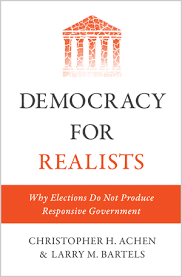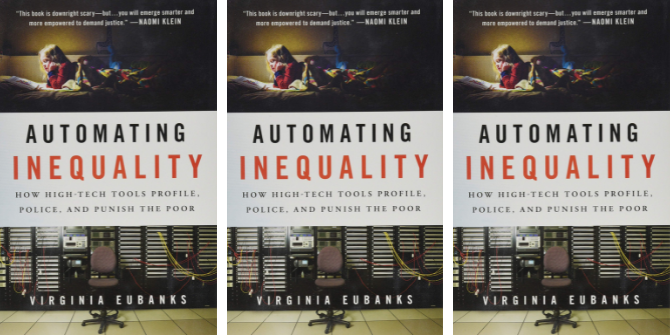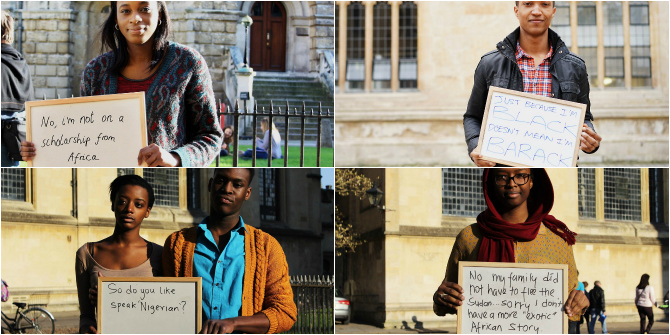In Democracy for Realists: Why Elections Do Not Produce Responsive Government, Christopher H. Achen and Larry M. Bartels challenge the ‘folk’ version of democracy that presumes that voting is undertaken by the ‘omnipotent, sovereign citizen’. Instead, they argue that voters tend to base their decision-making on partisan loyalties, leaving the current democratic system open to exploitation by powerful, unscrupulous actors. While noting that a number of its US-based examples are somewhat dated, Peter Carrol nonetheless recommends this as a vital and potentially enlightening companion for those struggling to make sense of the 2016 US presidential election result and its unfolding consequences.
Democracy for Realists: Why Elections Do Not Produce Responsive Government. Christopher H. Achen and Larry M. Bartels. Princeton University Press. 2016.
 The recent election of Donald Trump to the position of US President left many people perplexed. How could his campaign – a toxic mix of exaggerations, lies, fearmongering, xenophobia and sex scandal – succeed, elevating a man who has never held public office, and who some fear is temperamentally unfit to become president, to the highest political position in the land? And was his campaign a unique confluence of circumstances or did it merely highlight the long-term, structural flaws within the democratic system?
The recent election of Donald Trump to the position of US President left many people perplexed. How could his campaign – a toxic mix of exaggerations, lies, fearmongering, xenophobia and sex scandal – succeed, elevating a man who has never held public office, and who some fear is temperamentally unfit to become president, to the highest political position in the land? And was his campaign a unique confluence of circumstances or did it merely highlight the long-term, structural flaws within the democratic system?
Democracy for Realists: Why Elections Do Not Produce Responsive Government, by Christopher H. Achen and Larry M. Bartels, offers answers to these questions, as the authors – two of the world’s most prominent and celebrated political scientists – distil an entire career’s worth of learning into a single book.
The authors squarely take aim at the romantic notion of democracy, which they describe as ‘folk theory’. The folk theory of democracy is grounded in the Enlightenment tradition of rational choice: voters seek information, weigh the available evidence and then choose the government with the strongest policies to deliver on their pledges.
According to the authors, this ideal bears little resemblance to how democracy actually works. In fact, the ‘omnicompetent, sovereign citizen’ found in the influential writings of Robert Dahl and Walt Whitman is an unattainable myth: voters are incapable and uninterested in fulfilling the role required of them by democracy. Most people are too busy with jobs and families to give politics sufficient attention: rather than spending their leisure time studying the minutiae of trade deals or infrastructure planning, they, quite understandably, pursue more enjoyable pastimes.
Even the minority of voters that have the time and inclination to inform themselves about politics do not behave as folk theory contends. When faced with choice in a democracy, human judgement is overwhelmed by the complexity of the world and bent by self-interest. Voters use information not to challenge their own opinions but to rationalise them, which the authors describe as ‘enhanced bias’. To minimise cognitive dissonance – when an individual holds inconsistent opinions or beliefs – voters adjust their views to those of their favoured party, or simply avoid finding out what a party’s position is altogether if it conflicts with their own.
 Image Credit: Donald Trump in Reno, Nevada, 2016 (Darron Birgenheier CC BY SA 2.0)
Image Credit: Donald Trump in Reno, Nevada, 2016 (Darron Birgenheier CC BY SA 2.0)
The authors argue that voters are also afflicted by ‘duration neglect’, where individuals are only able to recall the past few months and are therefore incapable of accurately assessing political performance over the standard four-year term of office. Voters are guided by their own personal circumstances, often punishing leaders when economic conditions worsen and rewarding them when they improve, paying little heed to the politician’s actions.
This point is illustrated using the example of Franklin D. Roosevelt’s 1936 landslide election win. The author’s analysis finds that this election was not a ringing endorsement of FDR’s New Deal response to the Great Depression, but was rather the consequence of the relatively small economic upturn in the months prior to the election.
Additionally, external factors beyond the control of politicians regularly skew election outcomes. Natural disasters, such as droughts and floods, normally lead to voters attributing blame to whoever the incumbent is at the time: this is illustrated by how a spate of fatal great white shark attacks around the beaches of New Jersey in the summer of 1916 led to a ten per cent swing against Woodrow Wilson in the presidential election later that year. Bartels and Achen liken the habit of punishing politicians in this way to ‘kicking the dog to get back at a difficult boss at work’.
Instead of folk democracy’s rational voter, most voters base their political decisions on who they are rather than what they think. Political behaviour reflects our membership of a particular group, an expression of our social identity. Voters choose parties which represent their culture and community, and stay with their political tribe long after they have ceased to serve their interests.
Due to the spurious and capricious nature of democracy, the authors write that elections are little more than ‘a coin toss’ or a political version of ‘musical chairs’. The flaws in the democratic system mean election campaigns are fertile ground for exploitation by unscrupulous and powerful actors or, as the authors put it, ‘crackpots, rogue doctors and extreme interest groups’.
While the scope of the book is superb – particularly the opening chapters, which offer an excellent summary and primer of political science theory over the past century – the case studies draw exclusively on US examples, with many of these severely dated. There is very little reference to the media’s role in a democracy, while the digital revolution that has changed politics and voter behaviour in the past decade is not covered at all. Finally, the concluding chapter of the book, which offers proposals on how democracy can be made to function more effectively, feels somewhat cursory, given the multitude of flaws they have presented.
Bartels and Achen’s main recommendation is to limit private money in politics to curtail the role of special interests who exploit the weaknesses in the democratic process. But the advances in our understanding of psychology since the inception of the folk theory they highlight suggest that a complete overhaul of our governance is required. The grotesque spectacle of Trump’s campaign, and the danger that the next four years of his presidency poses to global stability, could at least have the silver lining of bringing this question to greater prominence.
While the authors emphasise that democracy remains far superior to alternative forms of governance, their argument that its virtues are not the ones that have been commonly attached to it throughout history is likely to make this book a timeless resource for political science scholars. And for anyone who is still struggling with the puzzle of Trump’s election, this book is a vital and enlightening companion to help us understand the strange events of late 2016.
Peter Carrol is a Media Relations Officer at LSE and MSc graduate in Politics and Communication. Read more by Peter Carrol.
Note: This review gives the views of the author, and not the position of the LSE Review of Books blog, or of the London School of Economics.








11 Comments